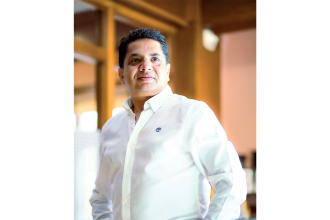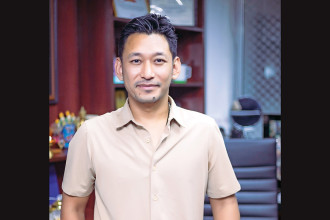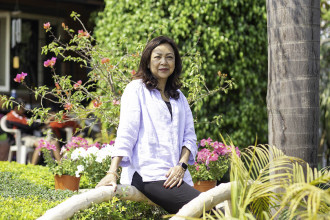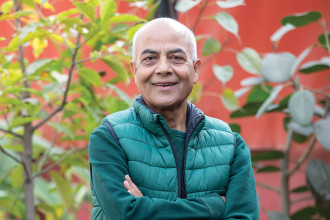.jpg)
Siddhartha Raja
Senior Digital Development Specialist World Bank Group
Born and brought up in Mumbai, Siddhartha Raja, Senior Digital Development Specialist at the World Bank Group, shares that his dream while growing up was very much fueled by the proliferation of computers in the 80s and 90s. “I grew up in this changing world where first computers were introduced and then the internet and people like Bill Gates and Steve Jobs started becoming household names,” he says, adding it was a time when India was liberalising its economy and an entirely new middle class had dreams driven by those emerging technologies.
Raja reminisces the days when commerce and art graduates who had limited career prospects earlier suddenly had a wide array of jobs due to the IT outsourcing industry. He mentions he was young at that time, but that the change was influential. While in school, he decided to take up computer science but a chance conversation with a friend introduced him to the existence of a field called telecom engineering. “I thought what could be more interesting than when you could study not only electronics and information technology but also satellites and fiber optics,” he states.
While doing his Bachelor’s in Telecom Engineering from Bombay University, Raja says he got interested in the link between technology and society. “There is always this strong connection between technology and economic development,” he says, adding that while researching the topic on the dial-up internet, he got the opportunity to read articles about the link between telecom and economic development. “That fascinated me and when I chose to do my Master’s in the United States, I focused on technology policies, so I moved from engineering to public policy and economics,” he elaborates.
With an urge to grow further, Raja then opted for Anthropology for his PhD because he wanted to understand the underlying cultural aspects of technology adoption and regulation. “I focused on telecom regulation as a cultural and political activity.” It was during his PhD, he says, that he got the opportunity to work with the Indian telecom regulator, which he calls a phenomenal experience. “I worked with some highly competent and motivated people and through that experience and network, found a job at the World Bank and I have been with the Bank since 2007,” he shares.
In this edition of Business 360, we spoke to Raja about the five things that have had an impacted his work and life. Here’s what he had to say…
Research and Operations
Initially, I joined World Bank as a short-term consultant. I was brought on board to write a report on media convergence and the big question then was what happens when a telephone does not remain solely a telephone. It becomes a TV, a web browser and so many different things. How do we regulate that? How do we encourage that kind of innovation because it can transform the world, as we have seen? But at the same time, we also had to look at how we adapt from the legacy system where those industries were regulated totally differently. Broadcast is regulated in one way, telecom in another, and media in a totally different way. We had to look at how developing countries could manage that kind of convergence. And so my work initially was research, but my mentors and supervisors at the Bank found that I added value beyond just being a researcher and soon, I was also supporting the operational side of work for which the World Bank is famous. For instance, in Nepal, we do a lot of operational work to finance major infrastructure and social projects, all towards the goal of economic development. I was lucky that early on in my career, I could get involved in that operational work as well.
Making an impact
My journey with the World Bank has been phenomenal. There isn’t a single day when I haven’t gone to the office with an equal mix of excitement and pressure because there are millions of people who are somehow impacted by what we are doing and trust us with what we are doing. For instance, there could be a family in Jumla that has a family member who is working abroad. They are going to rely on better internet connectivity whether it is to talk to that person or to get remittances. Or there could be a young person in Kathmandu who is looking for a better job or better economic prospects and that person could be looking to enhance their IT skills to improve their job prospects, to be globally competitive. So, there is always this mix of day-to-day administrative work, operational work, internal commitments and internal processes but at the same time there is also this constant push of knowing that we are doing something big and something important. In the end, serving the people to connect them to these expanded opportunities and whose lives can improve or change in some way or the other; this is something that keeps me going. And there is not a single day when I have been to work which is like any other day. I have had the great fortune of working in different countries and simultaneously work on more than one thing. For someone like me who is always excited about being involved in multiple things, it is a place that can absorb all of your energy and talent.
Working in a diverse environment
Many years ago, I was helping with a project for an Eastern European country and was part of an informal brainstorming session. We had to discuss a particular part of the project we were designing. There were around eight of us sitting around a table in the cafeteria of the headquarters of the Bank in Washington DC. The first amazing thing is we were talking about an Eastern European country in Washington DC. Then the people around the table were from different regions. I was from India and my other colleagues were from Eastern Europe, South America, East Asia and from the United States. There were people from different regions sitting around that table talking about another place with passion and professionalism, trying to come to some best possible solution to some specific development challenge. We have many discussions internally whether it is formal or informal, casual or serious where we bring together people from all over the world to discuss on something for another part of the world. And it is so normal for us that sometimes we tend to forget how unique that experience is. There are times when we can have completely different opinions because people come from different places and have different backgrounds like engineers, economists, doctors, or former bureaucrats and we are all arguing and discussing something even without the final resolution but trying to improve our understanding of the problem. I think this demands a lot of humility, because you need to be able to understand another person’s perspective. At the same time, it also needs a lot of integrity because you need to stick to your principles and position. But in some way or the other, we are all part of a shared value system and we are trying to arrive at the best possible solution for our counterpart clients and that beneficiaries for whom we are working. It is not always a simple process but is always very interesting.
Oftentimes, you will have dissenting opinions and debates and arguments but, in the end, what comes out is a strong idea or product that we are able to work on together. It is fascinating. The World Bank is a large institution but you meet the same people again in your career, over decades sometimes. It is hence also a place where you can build a strong network and bring people together in the future again to return to an old problem in a new context. For example, maybe you remember somebody had an opinion before, but it was maybe a dissenting view then, but in another situation could bring us closer to the solution. Thus, you can draw on very rich personal and professional experiences and expertise. You need to have that ability to engage and empathise and come together and it is always a very fascinating process.
.jpg)
The purpose of technology
There is a very rich debate right now about artificial intelligence and its impact. Personally, I would say it is early days to exactly tell what the impact will be like. Yes, we can make assumptions and predictions but as Yogi Berra said, predicting the future is difficult. In my view, like with every innovation there will be pros and cons. We could take an example of two people, one a teenager and the other a mid-career individual. A teenager today will be entering a workplace where these technologies will be embedded one way or the other. The crux will be how we ensure that we can invest in that teenager so that they can use a particular technology to the greatest extent possible to empower themselves. And we are already using AI actually. We use it in our searches online, for example. It is not a completely new thing; it is just entering into the mainstream. It is still an emerging field but the issue lies in how do we empower that young person so that when they enter the workforce, they are not replaced by technology but can use it to the greatest extent possible to enhance their productivity and creativity. We all know that the purpose of technology is to make our lives simpler and easier, whether it is a car which replaced a horse which replaced some human effort at some point. AI could similarly complement somethings that we do.
However, if you also look at someone who is in their mid-career then the question will be on how their careers can be impacted by this new development. In any workplace there will be parts which can be automated and some which cannot. More of the research on job losses now suggest that entire jobs will not be lost. It is just that there will be certain tasks within a job that will be automated. Hence, the question arises if a person can take on the responsibilities of that new task and upskills themselves. Or what could happen is there may be a lesser range of tasks they are engaged in and their wages have to be reduced. As you can tell, there is no simple answer yet. Like every other technology it is going to evolve over time and people will learn to adapt to the technology.
The AI debate right now is like the debate we used to have in the 1980s and 90s regarding robotics. There was a fear back then that robots would take over all our work but nothing of that sort has happened. In fact, what has happened though is we have made manufacturing, construction and a lot of other dangerous occupations a lot safer and easier. It is going to be a mediated process. Some of the research on the impact of AI on jobs have suggested that a high-skilled job will not be affected negatively so much. Similarly, a lower-skilled manual type of job will also not be affected negatively as much. There is a lot that AI cannot do and which needs physical intervention. It is the middle scale where it is easier to automate things because it is more replicative and repetitive. The divergence or disappearance will happen in the middle. And what could happen is this could create an economic divide between people like how we see people in cities earn more than those in rural areas. So, we will have to start looking at how do we mitigate that.
Empathy in leadership
Since the time I joined the World Bank, I have moved around to several places, and I think this movement itself is a motivation because you directly or indirectly touch the lives of so many people from various backgrounds. I will always be grateful to the institution for the opportunity I have had to have a positive impact on people’s lives way beyond what I could have done on my own or in other situations. This is an organisation where you get the chance to work with a diverse team and governments which then has a direct impact on millions of lives. While growing up in Bombay, I recognised how access to the internet changed my life. This created in my mind a vision of the world that was so much bigger than the city which was already very globalised. It made the world feel more accessible and understandable. These days with the click of a mouse or a button we can reduce the distance to knowledge and connect to people. I have always wanted to share that possibility with others. The best aspect is I get to do the work I love on a daily basis but I also get to have an impact on the education, health, or financial sectors because digital tech is everywhere.
So that ability to influence a bigger dream and create opportunities in a multicultural environment is very invigorating. However, for any work one does they must have the leadership skills to get the job done. For me, leadership comes down to two things underlined by a third. The first is the ability to define an objective and a vision for the group you are working with. The crucial question is what the objective or vision is and what are we trying to achieve and to be able to communicate that effectively to your team. The second aspect would be to be able to trust your team, to allow them to apply their creativity and talent to achieve that objective. And so it is that ability to bring people around towards a certain vision or task while also empowering and trusting them to work towards that. And the factor which is very critical is to have empathy. How do you give feedback constantly in a meaningful and empathetic way because due to some personal circumstances or challenges people may not be able to get around a problem? So, you need to understand where the problem is and how do you then help your team member to come out of that or help them to solve it. Constant listening is also vital because no one person is right all the time and you have to be able to course correct. You must learn to understand and see when things go wrong or off-track. So, you must be able to take the views of your team members and take decisions based on that. Leadership is not a natural thing always, and you also can and have to learn along the way. ![]()





